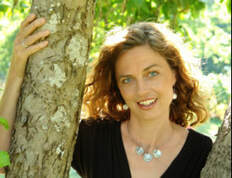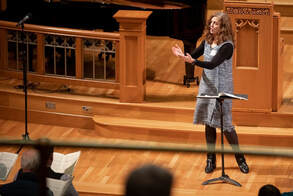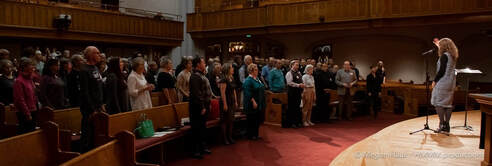|
By Sonia Fang, Director, Magnolia Chorale  Dr. Jean-Marie Kent, Musical Director, Magnolia Chorale. Dr. Jean-Marie Kent, Musical Director, Magnolia Chorale. An interview with Magnolia Chorale Music Director Dr. Jean-Marie Kent The Magnolia Chorale is on summer break after our rousing and well-attended “Voices Raised” concert in April. So, it seemed like a good time to catch up with our incredible music director, Dr. Jean-Marie Kent, on a few topics she’s passionate about—choral singing and community choirs. Jean-Marie earned her doctorate in choral conducting from the University of Washington, specializing in collaboration and community engagement. Before that, she taught music and conducted orchestras and choirs across the U.S. and Canada. This is actually her second stint as Magnolia Chorale music director. The first was from 2008 to 2010. She returned in 2013, and has been keeping us in harmony ever since. She also teaches the choir at Roosevelt High School. Those of you who have been to our concerts have probably appreciated the thoughtfulness that Jean-Marie brings to the program notes as well as her uncanny ability to bring both cohesion and variety to a repertoire. Audiences also enjoy her engaging anecdotes as she introduces the pieces. Here is just a sample of the creative and thoughtful approach Jean-Marie takes to bringing the very best out of every group she conducts.  Jean-Marie conducts part of Movement II from Brahms Ein Deutsches Requiem during the 2018 Big Sing Event. Photo:© Megan Hauk/HMMM productions. Used with permission. Jean-Marie conducts part of Movement II from Brahms Ein Deutsches Requiem during the 2018 Big Sing Event. Photo:© Megan Hauk/HMMM productions. Used with permission. How do you approach creating a repertoire for each concert? JMK: I always enjoy the challenge of creating a program. I carve out a big chunk of time when I can think creatively. When I choose repertoire for my school choirs, I am thinking about the educational aspect (solfeggi, leaps, minor modes, languages, difficulty), and I only have to choose three to four songs for a concert. With community choirs, I am selecting between 13 and 15 pieces, usually involving collaboration with other musicians. To tie the pieces together, I look for the common thread that I want to present to the audience. In many ways the theme is for the audience more than for the choir. Sometimes the pieces are very connected and the theme easily emerges. Other times, I wish that I could call it "Pieces I Like" and not have to find pieces that are linked. You have the unique perspective of having conducted the Chorale through two different time periods. How has the group changed over the years? JMK: We are becoming a younger group. I love that there are many people who are coming back to singing. When I began conducting the Chorale, many of our members were founding members. They had grown up singing, many of them singing together. The working operations relied heavily on a few individuals. That has definitely changed under Director Ann Macfarlane's talent. We now have systems and guidelines. Ann knows that for an organization to continue, systems must be in place so that even when individuals change, the organization does not. Under her direction, many of us decided that it was important for everyone to be involved. The work should be shared among us so that we all feel committed to the Chorale and no one should feel overworked. One thing that is so great about a community choir is the diversity of experiences, knowledge, and skill that each member brings to the choir. What do you find most inspiring about working with a community choir? JMK: People in community choirs choose to be there because they like to sing with others. They show up week after week, ready to take on a creative endeavor. I love singing harmonies! You just can't get that feeling singing by yourself. What has been one of the most exciting or rewarding moments for you as a choral conductor? JMK: When I was at the University of Regina in 2011, I put on a concert in memory of Courtney Milne, a prominent Saskatchewan artist and nature photographer who had recently passed away in August 2010. I had the space in my life to think deeply about the project. I got to know his partner, Sherrill Miller. I looked at all his photos, read all his writings and chose music that spoke to the themes of his life. I rehearsed my singers so that they were able to sing without thinking about the music but could really be immersed in the performance. It was a very spiritual experience when we performed it. Courtney was an example of an artist who lived his art. The concert inspired all of us to find our artistry within ourselves.  Jean-Marie warms up singers before the Big Sing 2018. Photo:© Megan Hauk/HMMM productions. Used with permission. Jean-Marie warms up singers before the Big Sing 2018. Photo:© Megan Hauk/HMMM productions. Used with permission. How do you characterize your conducting style? JMK: "You catch more bees with honey." I have the unique position in the room. I have to tell people what to do. I try never to scold, just to lead. We improve when we feel both comfortable and challenged. People need to feel that they are valued within the ensemble for their expertise, for their joy, for their voices. Once they understand they have strengths that are appreciated, they can open themselves up to challenges. I believe that it is a process; things do not happen right away. Any words of advice for people who are interested but apprehensive about singing in a choir? JMK: Come and give it a try. Usually what stands in people's way is pulling themselves out of the house on a Sunday night. It's tempting to just cozy up on the couch with Netflix. The truth is that singing in the Magnolia Chorale on a Sunday night is a great way to start the week. It connects you with others. We always laugh, we talk, and we know about each other's lives. You can't find that on the couch! If you’re interested in singing in harmony with a friendly group of singers, please contact us for more details. |
Magnolia Chorale is...a community of singers who enjoy spending time together making great music.
|

 RSS Feed
RSS Feed